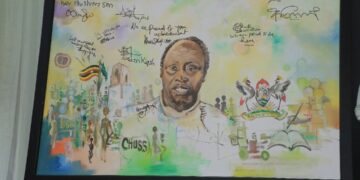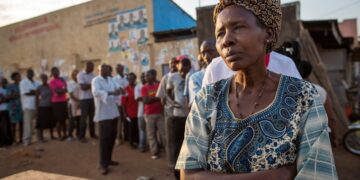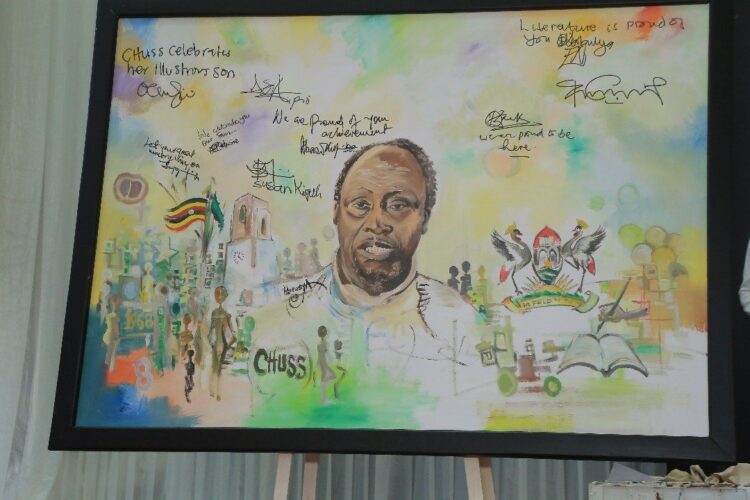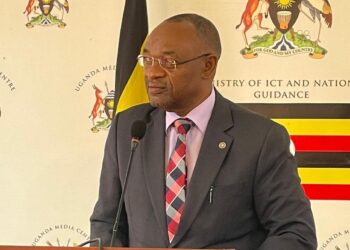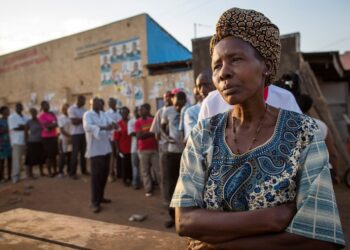By Atukwatse Ritah,
KAMPALA,
Makerere University on Oct 22, 2025 held a touching public lecture in memory of the late Kenyan literary icon, Ngugi wa Thiong’o, celebrating his lasting bond with the university and his great contribution to African literature and decolonization. The event was organized by the College of Humanities and Social Sciences (CHUSS) through the Department of Literature, bringing together academics, students, and lovers of literature from across the country.
The public lecture attracted a large audience that included lecturers and students from Makerere University, as well as students from secondary schools such as Gayaza High School and Kawempe Muslim Secondary School. The presence of young learners reminded everyone of the generations Ngugi continues to inspire through his books and ideas.
Ngugi’s family members, unable to travel to Uganda, joined the event online via Zoom, expressing their gratitude to Makerere University for honoring their father’s memory and academic journey.
The Deputy Vice Chancellor for Academic Affairs, Professor Sarah Ssali, represented the Vice Chancellor, Professor Barnabas Nawangwe, who was the guest of honor. She delivered a moving speech on behalf of the university, highlighting Ngugi’s long-standing relationship with Makerere.
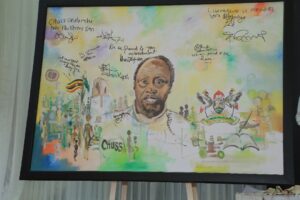
“Ngugi always said that being part of Makerere made him proud,” said Professor Ssali. “He carried the spirit of this university wherever he went, and his works continue to represent the intellectual that Makerere stands for.”
The keynote address was delivered by Professor Al-Hajji Abbasi Kiyimba, . In his passionate presentation, Professor Kiyimba narrated Ngugi’s life story, emphasizing his devotion to writing and his fight for independence, nationalism, and cultural identity.
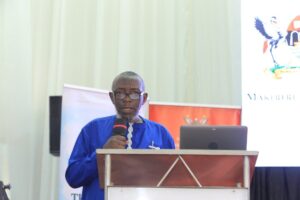
Professor Kiyimba revealed that while studying at Makerere, Ngugi wrote stories for newspapers in both Uganda and Kenya. He graduated with a Second Class Upper Degree, a reflection of his academic excellence.
While reflecting on Ngugi, Professor Kiyimba narrated a story, “One day, a passenger asked Ngũgĩ what he did for a living. When he said, ‘I write novels,’ the passenger replied, ‘Don’t worry, you’ll get a proper job one day.’ Ngũgĩ laughed it off because he knew that literature was not just a job — it was his calling.”
“Ngugi wa Thiong’o remains an inspiration to Makerere University,” Professor Kiyimba concluded, “because he taught us to think critically, write courageously, and never forget where we come from.”
One of the most emotional moments of the event came when Mr. Tumwesigye Precious, presented a poem dedicated to Ngugi wa Thiong’o. The poem, rich in imagery and emotion, moved the audience to silence and reflection.
“Ngugi crossed the rivers of life but left a name to remember,” Tumwesigye recited. His words captured the spirit of a man who used literature as a tool of resistance and education.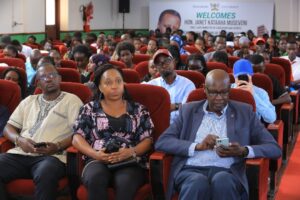
Through his famous novels such as The River Between, Weep Not, Child, Devil on the Cross, and many others, Ngũgĩ used storytelling to expose injustice and to promote equality.
Dr. Susan Kiguli, Head of the Department of Literature at Makerere University, spoke passionately about Ngugi’s legacy and his deep connection with the university.
“It is a great honor to sit in the same hall where Ngugi once sat,” said Dr. Kiguli. “He began writing in English, but later chose to write in his mother tongue as a sign of nationalism”.
Dr. Kiguli described Ngugi as a man of great humility and passion, who saw literature not just as art but as a form of liberation. “He contributed immensely to African literature and the struggle for decolonization. He will surely be missed, but his words will continue to live among us,” she said.
Ngugi wa Thiong’o, born in 1938 in Kenya, rose to become one of Africa’s greatest novelists, playwrights, and essayists. His works, including A Grain of Wheat and Petals of Blood, explored themes of oppression, identity, and liberation.
During his lifetime, he was imprisoned, exiled, and censored for his outspoken views on postcolonial politics and inequality. Yet, through all the challenges, he remained committed to writing and teaching.
His time at Makerere University, where he studied and began his writing journey, left a deep mark on his life and career. It was at Makerere that he first published his stories and gained the recognition that later made him an international figure.
Indeed, Ngugi may have crossed the rivers of life, but his words continue to flow through the hearts of people, and are unforgettable.
